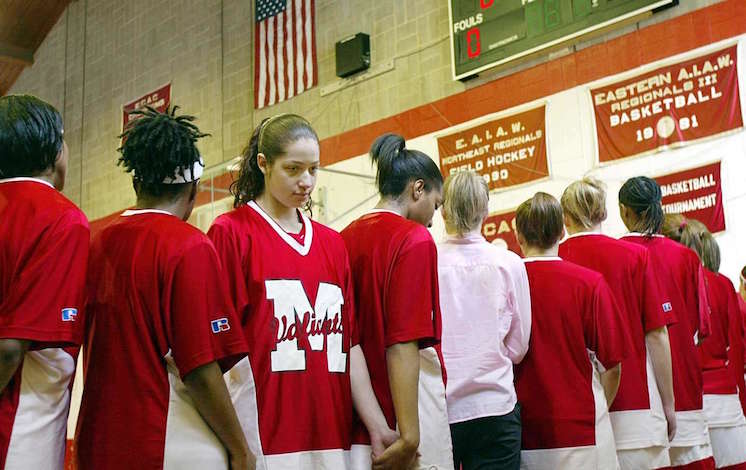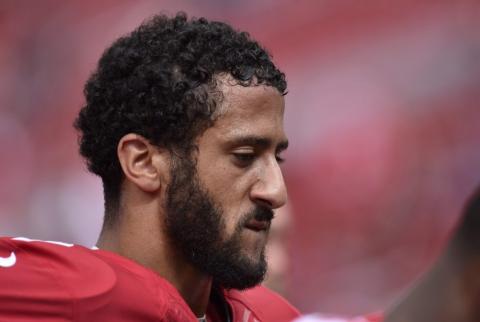1. Insulting Colin Kaepernick Says More About Our Patriotism Than His, By Kareen Abdul-Jabbar, The Washington Post, August 30, 2016
During the Olympics in Rio a couple of weeks ago, Army Reserve 2nd Lt. Sam Kendricks was sprinting intently in the middle of his pole vaulting attempt when he heard the national anthem playing. He immediately dropped his pole and stood at attention, a spontaneous expression of heartfelt patriotism that elicited more praise than his eventual bronze medal. Last Friday, San Francisco 49ers quarterback Colin Kaepernick chose not to stand with his teammates during the national anthem. To some, Kendricks embodies traditional all-American Forrest Gump values of patriotism, while Kaepernick represents the entitled brattish behavior of a wealthy athlete ungrateful to a country that has given him so much.
In truth, both men, in their own ways, behaved in a highly patriotic manner that should make all Americans proud.
The discussion of the nuances of patriotism is especially important right now, with Trump and Clinton supporters each righteously claiming ownership of the “most patriotic” label. Patriotism isn’t just getting teary-eyed on the Fourth of July or choked up at war memorials. It’s supporting what the Fourth of July celebrates and what those war memorials commemorate: the U.S. Constitution’s insistence that all people should have the same rights and opportunities and that it is the obligation of the government to make that happen. When the government fails in those obligations, it is the responsibility of patriots to speak up and remind them of their duty.
One of the ironies of the way some people express their patriotism is to brag about our freedoms, especially freedom of speech, but then brand as unpatriotic those who exercise this freedom to express dissatisfaction with the government’s record in upholding the Constitution. Colin Kaepernick explained why he will not stand during the national anthem: “There are a lot of things that are going on that are unjust people aren’t being held accountable for. And that’s something that needs to change. That’s something that this country stands for — freedom, liberty, justice for all. And it’s not happening for all right now.”
What makes an act truly patriotic and not just lip-service is when it involves personal risk or sacrifice. Both Kendricks and Kaepernick chose to express their patriotism publicly because they felt that inspiring others was more important than the personal cost. Yes, Kendricks is a national champion pole-vaulter, but every athlete knows that breaking focus and concentration during a high-pressure competition can be devastating to the athlete’s performance. The Olympics was filled with favorites who faltered because of loss of focus. Halting his run in order to honor the national anthem could have cost Kendricks his medal. He was willing to take that chance.
Likewise, Kaepernick’s choice not to stand during the national anthem could create a public backlash that might cost him millions in future endorsements and affect his value as a player on his team, reducing salary earnings or even jeopardizing his job. If team ticket sales seriously dipped as a result, he would pay for his stance.
San Francisco 49ers quarterback Colin Kaepernick says he plans to sit through the national anthem until he feels the American flag represents "what it is supposed to represent." (AP/ESPN)
We should admire those who risk personal gain in the service of promoting the values of their country. Both athletes are in fine company of others who have shown their patriotism in unconventional ways. In 1989, when a federal law prohibiting flag desecration went into effect, Vietnam Veterans burned the American flag as a protest to a law curbing the First Amendment. Their argument was that they fought for the freedoms in the Constitution, not a piece of cloth, and to curtail those freedoms was an insult to their sacrifice. Ironically, the original purpose of flag desecration laws between 1897 and 1932 wasn’t to prevent political dissent, but to prevent the use of flag imagery for political campaigns and in advertising.
One sign of the maturation of American society is the willingness of those in the public eye, especially athletes, to openly take a political stand, even if it could harm their careers. The modern era of athletes speaking out began in 1967 with Muhammad Ali refusing to be drafted to fight other people of color. That year, I joined with football great Jim Brown, basketball legend Bill Russell, Muhammad Ali and other prominent athletes for what was dubbed “The Cleveland Summit.” Together we tried to find ways to help Ali fight for his right of political expression. I don’t know how much we were able to accomplish on a practical level, but seeing black athletes in support of Ali inspired others to speak out. The following year at the 1968 Olympics, African Americans Tommie Smith and John Carlos raised their fists during the medal ceremony as a protest to the treatment of people of color in the United States. In 2014, NBA players LeBron James, Kyrie Irving, Jarrett Jack, Alan Anderson, Deron Williams and Kevin Garnett and NFL players from the Rams and Browns wore “I Can’t Breathe” shirts during warm-ups for a game to protest police killings of unarmed blacks.
What should horrify Americans is not Kaepernick’s choice to remain seated during the national anthem, but that nearly 50 years after Ali was banned from boxing for his stance and Tommie Smith and John Carlos’s raised fists caused public ostracization and numerous death threats, we still need to call attention to the same racial inequities. Failure to fix this problem is what’s really un-American here.

Toni Smith (third from left) turning away from the flag during the national anthem before a February 23, 2003, game at Manhattanville College in Purchase, New York. (AP Photo / Stuart Ramson)
On Friday night, San Francisco 49ers quarterback Colin Kaepernick made the decision that he would not stand for the national anthem before his team’s preseason game against the Green Bay Packers. Afterward, he made a lengthy statement to NFL media, the heart of it being, “I am not going to stand up to show pride in a flag for a country that oppresses Black people and people of color.”
Both Kaepernick’s words and deeds had a familiar ring for me. They recalled another moment of athlete activism and the national anthem. But it didn’t happen in the NFL, and it wasn’t the action of someone possessing wealth or fame. It was an unlikely protest, at a moment when the hard work of political dissent was unheard of on the field of play.
The year was 2003 at the start of the Iraq war. The scene was a small Division III school called Manhattanville College in Purchase, New York, and the political actor was a senior forward on the women’s basketball team named Toni Smith. In an atmosphere thick with jingoistic fervor, Smith made the decision to turn her back on the flag during the national anthem.
In those relatively primitive internet days, the story still managed to go viral and the outrage directed at Toni Smith was volcanic. The webpage of the liberal arts college had 2 million hits. Threats of violence were sent to the school and were palpable in the stands. Even though this was all before social media—which has amplified every threat and created a virtual white hood for the 21st century bigot—there was an effort to bury Toni Smith for the crime of practicing dissent. Yet still she stood strong, explaining her actions by saying:
“A lot of people blindly stand up and salute the flag, but I feel that blindly facing the flag hurts more people. There are a lot of inequities in this country, and these are issues that needed to be acknowledged. The rich are getting richer and the poor are getting poorer, and our priorities are elsewhere.”
She broke it down further to me in an interview back then by saying, “I’m from a mixed racial and ethnic background. My mom is Jewish, and my dad is Black, white and Cherokee. I was learning about the prison industrial complex and the wars against Native Americans…. This flag represents the slaughter of our ancestors.”
Today her name is Toni Smith-Thompson. She lives in New York City and works for the New York Civil Liberties Union. I had to get in touch with her to ask what she thought about Kaepernick’s actions. She emailed me the following. Her comments are sharp and worth a read and reread.
For years I have wondered how I would’ve weathered the backlash from my protest in the age of social media. Now, I am watching it happen. Colin Kaepernick has a vastly greater platform than I did, which will make his protest more visible, more impactful and more dangerous. I am beyond proud of his conviction and hope sports fans who cheered him on for his athletic skills will stand by him still and affirm that we don’t check our freedoms in the locker room. For us activists, Colin will need our support and solidarity. He is using his platform to stand up to oppression, joining a small but growing number of athletes to do so. We should rise to the occasion, not just for him but for us as well.
Smith also said, “Corporations have long understood the power of athletes to sell their brand, and pay heftily for it. But Colin is not asking for compensation to sell social justice; in fact, he will likely pay for it. He’s not only standing up to oppression of people of color, he’s standing up to corporate censorship of athletes. Both sports fans and social justice activists alike should crowd-source his message and drive it into as many US homes as possible, for freedom is never free and Colin just made a down payment.”
Here’s hoping that Toni Smith-Thompson is able to communicate directly with Colin Kaepernick in the days ahead. There are few people who have walked the path he is choosing to take. Kaepernick has the worst of the sports commentariat and hordes of social media scolds shouting in his ear about all he is about to lose. Toni Smith-Thompson is one of the few who can tell him what he stands to gain.
Copyright c 2016 The Nation. Reprinted with permission. May not be reprinted without permission. Distributed by Agence Global.
Please support our journalism. Get a digital subscription to The Nation for just $9.50!


Spread the word